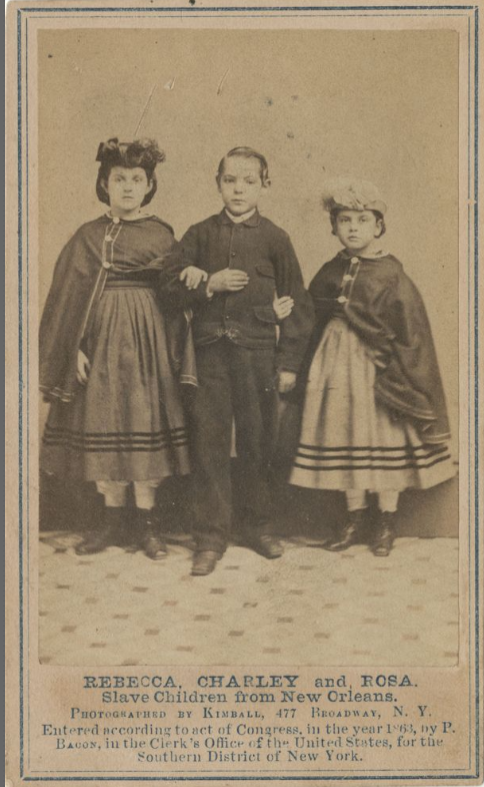» History News: A Photo of Rebecca, Charley and Rosa: on Self-Identification and Social Empathy by Kangkang Kovacs
In front of a massive camera stood three children: Rebecca, Charley and Rosa. Rebecca and Rosa were wrapped in capes and petti-coats – Rebecca’s hair stylishly curled, Rosa wearing a fancy hat; Charley, the boy with soft, blond hair in the middle, had one girl on each arm. At the time the photo was taken, Rebecca was eleven, Charley eight, Rosa seven. Despite their tender ages, the three children carried themselves like gentlemen and ladies at the entrance of a ball.

The photo was entitled: Slave Children from New Orleans, dated 1863.
Rebecca, Charley, and Rosa looked completely white: fair complexion, light, silky hair. They were the son and daughters born to white fathers (often times their owners and sellers as well) and enslaved, mulatto mothers. All three children had been the property of slaveholders1 in New Orleans and emancipated not long before the picture was printed on cartes-de-visite.2 In the post-civil-war South, photographs of emancipated children were sold to raise money for the education of freed slaves. There were many of them. But the photo of Rebecca, Charley and Rosa were among the most well-known – they were the “enslaved white children” of the South.
For the Northerners it was a spectacle brimming with controversy: many noted the large number of enslaved populations who seemed to be “white” in the Southern states. Races were mixed due to the commonplace sexual exploitation of enslaved women, and children born to an enslaved mother were doomed to remain slaves, owned and sold by their fathers. Rumors about “white” girls being sold as “fancy girls” or concubines in Southern slave markets spread, raising the eyebrows of white northerners – the children’s pale skin brought the cruel absurdity of slavery close to home. Suddenly they could see themselves in the enslaved. Looking at Rebecca, Charley and Rosa, they shuddered at the thought of their own daughters and sons.
Self-identification has played, and still does play a prominent role in our social conscience. In February 2022, CBS News correspondent Charlie D’Agata reported from Kyiv, Ukraine, he commented on the chaos and brutality brought upon by the Russian invasion: “this (Kyiv) isn’t a place, with all due respect, like Iraq or Afghanistan…this is relatively civilized, relatively European city… where you wouldn’t expect that.”3 The CBS reporter does not stand alone. The sentiment that “these are common middle-class people like you and me”, and “this is Europe, not some third-world country” can be found in many media coverages on Ukraine. There seems to be a common connotation, an assumption that European civilians are more “civilized” and therefore less deserving of war crimes than the people who live in Africa or the Middle-East.
Any war is an atrocity towards all humanity. But war victims are not perceived equally. Self-identification can deepen our bond with those who suffer, strengthening social empathy; It can be a limiting factor as well however, allowing us to draw distance from those who look different, boxing them up in crude stereotypes, sweeping under the rug our shared humanity. The image of the three enslaved children and its popularity at the time serve as a jarring reminder: let us not keep our eyes shut to the injustice and atrocities others have suffered, unless the victim looks like me.
Sources
- Charley had been sold twice with his mother by the time the photo was taken, first time by his father, according to an article on The Harper’s Weekly, January 30, 1864. A full transcript of the article can be found here: https://www.gilderlehrman.org/history-resources/spotlight-primary-source/enslaved-children-new-orleans-1863
- Cartes-de-visite was a type of relatively cheaper, small photograph patented in 1854. Each photograph was the size of a visiting card, and such cards were commonly traded among friends and visitors.
- Kesslen, Ben. “CBS News’ Charlie D’Agata Apologizes for Saying Ukraine More ‘Civilized’ than Iraq, Afghanistan.” New York Post, 27 Feb. 2022, https://nypost.com/2022/02/26/cbs-news-charlie-dagata-apologizes-for-saying-ukraine-more-civilized-than-iraq-afghanistan/.
Image Credits
- Kimball. “Rebecca, Charley and Rosa. Slave Children From New Orleans.” 1863. Lowcountry Digital Library, Avery Research Center at the College of Charleston, https://lcdl.library.cofc.edu/lcdl/catalog/lcdl:80120 .
